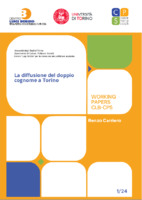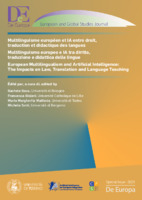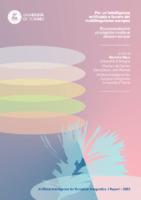Sfoglia documenti (228 in totale)
Sort by:
La diffusione del doppio cognome a Torino
La diffusione del doppio cognome ha suscitato un interesse significativo dopo la sentenza della Corte Costituzionale che ha reso illegittima la trasmissione automatica del cognome paterno ai figli. Questo studio si propone di esaminare l'adozione del doppio cognome nei neonati torinesi nel periodo compreso tra giugno 2022 e dicembre 2023. L'analisi si basa su 8650 atti di nascita registrati presso il comune di Torino. Nel periodo post-sentenza, l'84,7% dei neonati ha ricevuto solo il cognome paterno, mentre il 12,1% ha ricevuto il doppio cognome. Tuttavia, il primo cognome è generalmente quello paterno nel 92,6% dei casi di doppio cognome. L'incidenza del doppio cognome è stata analizzata anche in relazione alla cittadinanza dei genitori e allo stato civile della madre. Si osserva un’associazione significativa tra stato civile e scelta del cognome, con un maggiore utilizzo del doppio cognome tra le madri non coniugate. Inoltre, le “coppie miste” con madre italiana e padre straniero mostrano una tendenza più marcata verso l'uso del doppio cognome, suggerendo che questa scelta possa riflettere una strategia per mantenere parte dell’identità italiana laddove la trasmissione automatica del cognome paterno non lo consentirebbe. Inoltre, la distribuzione del doppio cognome sul territorio comunale risulta molto variabile, con una concentrazione maggiore nei quartieri semi-centrali e a ridosso della collina. La distribuzione è statisticamente spiegabile in buona misura con il reddito medio del quartiere e ciò è interpretabile come indicatore dell’influenza di orientamenti culturali relativi alla parità di genere e alle relazioni familiari, maggiormente diffusi nei quartieri a più alto reddito. Seguendo la teoria della diffusione delle innovazioni di Rogers, l’analisi suggerisce che l'adozione del doppio cognome richiederà tempo e un ambiente socio-culturale favorevole. In base alla teoria e ai risultati empirici ottenuti finora si può ipotizzare che al momento siano solo i cosiddetti early adopters ad aver scelto di sperimentare l’innovazione costituita dal doppio cognome.
Ringraziamenti
L’autore ringrazia Katya Finardi del Comune di Torino per il puntuale lavoro di raccolta e trasmissione dei dati degli atti di nascita; i colleghi Francesco Fiermonte e Davide Pellegrino del Dipartimento Interateneo di Scienze, Progetto e Politiche del Territorio dell’Università e del Politecnico di Torino per la realizzazione della mappa presentata in Figura 3; i colleghi Giulia Dotti Sani, Riccardo Ladini e Francesco Molteni del Dipartimento di Scienze Sociali e Politiche dell’Università di Milano per i commenti a una prima versione di questo testo.
Ringraziamenti
L’autore ringrazia Katya Finardi del Comune di Torino per il puntuale lavoro di raccolta e trasmissione dei dati degli atti di nascita; i colleghi Francesco Fiermonte e Davide Pellegrino del Dipartimento Interateneo di Scienze, Progetto e Politiche del Territorio dell’Università e del Politecnico di Torino per la realizzazione della mappa presentata in Figura 3; i colleghi Giulia Dotti Sani, Riccardo Ladini e Francesco Molteni del Dipartimento di Scienze Sociali e Politiche dell’Università di Milano per i commenti a una prima versione di questo testo.
Maestri dell'Ateneo torinese dal Settecento al Novecento
Con il volume sui Maestri, il Centro Studi di Storia dell'Università di Torino ha inteso contribuire alle ricerche promosse dal Magnifico Rettore nella ricorrenza del sesto centenario della fondazione dell'Ateneo. Il Centro ha scelto di ricordare, in questa occasione, docenti di discipline diverse che, con il loro magistero, gli studi e le ricerche, hanno illustrato, tra il tardo Settecento e la prima metà del Novecento, l'Università di Torino.
I primi 11 saggi sono dedicati ad altrettanti Maestri in aree diverse del sapere, e alle scuole da essi create, cui seguono 74 schede bio-bibliografiche di altre celebri personalità nella ricerca e nella didattica presso l'Ateneo torinese.
Apprendimento laboratoriale in Matematica e Fisica in presenza e a distanza Torino, 11-12-13 ottobre 2021 - online
Il X Convegno Nazionale di Didattica della Fisica e della Matematica si è svolto on-line nei giorni 11-12-13 ottobre 2021 ed ha focalizzato l’attenzione su come si possa attuare una didattica laboratoriale in matematica e in fisica non solo in presenza ma anche a distanza, come è accaduto negli anni del lockdown. Obiettivo e risultato del Convegno è stata la condivisione delle numerose esperienze positive realizzate nei due anni caratterizzati dalla pandemia da Covid-19, per renderle fonte di ispirazione per una didattica efficace anche in situazioni di normale svolgimento delle attività scolastiche. Come di tradizione, la terza giornata è stata dedicata al GeoGebra Day.
Il Convegno è stato anche questa volta momento di riflessione e di scambio, con articolazioni a partire dalla scuola primaria fino ad arrivare all’Università.
Nelle sessioni plenarie si sono affrontati sia aspetti culturali più ampi, in particolare legati al divario di genere ed al tema dell’infinito, sia aspetti più prettamente didattici, presentando il possibile utilizzo delle moderne tecnologie per realizzare attività di laboratorio senza strumentazioni complesse.
La realizzazione on-line ha consentito una straordinaria partecipazione al Convegno, con circa 650 iscritti in ogni giornata. Oltre all’ampia partecipazione dei docenti della scuola secondaria di secondo grado (circa 430), è stata più estesa, rispetto alle edizioni precedenti, quella dei docenti della scuola secondaria di primo grado (circa 130), dei docenti della scuola primaria (circa 80) e dell’Università (quasi 90).
Le comunicazioni presenti negli Atti sono 17 di Fisica, 22 di Matematica e 5 interdisciplinari a cui si aggiungono 17 workshop di Matematica e 7 workshop interdisciplinari.
Matematica e Fisica nella cultura e nella società. Atti del IX Convegno Nazionale di Didattica della Fisica e della Matematica DI.FI.MA. 2019. Torino, 9-10-11 ottobre 2019 - Liceo «M. D’Azeglio»
Il IX Convegno Nazionale di Didattica della Fisica e della Matematica, svoltosi a Torino nei giorni 9-11 ottobre 2019, ha focalizzato l’attenzione sull’impatto che la didattica di queste discipline può esercitare nella cultura e nella società attuali. Come di tradizione, la terza giornata è stata dedicata al GeoGebra Day. Nelle sessioni plenarie e nelle tavole rotonde si sono affrontati sia aspetti culturali più ampi che coinvolgono anche la società (“Storia e strumenti: valorizzare didatticamente il patrimonio scientifico delle scuole”,” Trasposizione culturale: dall’early algebra alla modellizzazione di fenomeni”), sia aspetti più prettamente didattici (“Conoscenze di fisica di base degli studenti al termine della scuola secondaria”, “La matematica e la fisica all’Esame di Stato. Luci e ombre, problemi e opportunità”, “Design di attività esplorative con GeoGebra a supporto dei processi argomentativi: il progetto STEP”).
Il Convegno ha raccolto circa 150 persone per ogni giornata, con la partecipazione anche di scuole provenienti da fuori della Regione Piemonte: circa il 20% nelle prime due giornate e circa il 28% nel GeoGebra Day.
Il Convegno è stato anche questa volta momento di riflessione e di scambio, con articolazioni a partire dalla scuola primaria fino ad arrivare alla scuola secondaria di secondo grado.
Multilinguisme européen et IA entre droit, traduction et didactique des langues
Multilinguismo europeo e IA tra diritto, traduzione e didattica delle lingue
European Multilingualism and Artificial Intelligence: The Impacts on Law, Translation and Language Teaching
Ce numéro spécial de la revue De Europa recueille les contributions interdisciplinaires et multilingues issues des travaux du groupe de recherche sur les droits et les variations linguistiques en Europe qui ont été entamées depuis 2020 pour le projet Artificial Intelligence for European Integration — AI4EI.
La première partie du livre a permis d’entamer des réflexions sur l’IA et le multilinguisme européen par rapport au droit, par exemple en abordant la question de la traduction juridique automatique ou de la terminologie juridique en relation à l’utilisation de l’IA.
La deuxième partie du livre rassemble des études concernant les expérimentations pédagogiques menées par les universités qui ont participé au projet. À ce sujet, la nécessité de stimuler une posture critique vis-à-vis des nouvelles technologies se révèle fondamentale pour une intégration réussie des dispositifs basés sur l’intelligence artificielle dans la pédagogie universitaire.
Il volume fa parte del progetto AI4EI (https://www.jmcoe.unito.it/)
La première partie du livre a permis d’entamer des réflexions sur l’IA et le multilinguisme européen par rapport au droit, par exemple en abordant la question de la traduction juridique automatique ou de la terminologie juridique en relation à l’utilisation de l’IA.
La deuxième partie du livre rassemble des études concernant les expérimentations pédagogiques menées par les universités qui ont participé au projet. À ce sujet, la nécessité de stimuler une posture critique vis-à-vis des nouvelles technologies se révèle fondamentale pour une intégration réussie des dispositifs basés sur l’intelligence artificielle dans la pédagogie universitaire.
Il volume fa parte del progetto AI4EI (https://www.jmcoe.unito.it/)
Per un’intelligenza artificiale a favore del multilinguismo europeo Raccomandazioni strategiche rivolte ai decisori europei How artificial intelligence can further European multilingualism Strategic recommendations for European decision-makers
Il presente report intende fornire ai policy e decision makers dell’Unione europea degli argomenti e dei dati utili al fine d’investire su un’intelligenza artificiale a favore del multilinguismo europeo, proponendo quattro raccomandazioni specifiche. A tale scopo, il gruppo di lavoro sulle attività linguistiche che si è costituito attorno alla rete del Centro d’eccellenza Jean Monnet Artificial Intelligence for European Integration (AI4EI) a Torino ha inteso far dialogare persone esperte nei settori della linguistica, della glottodidattica, della traduzione, dell’analisi del discorso, dell’informatica e dell’ingegneria per l’informazione così da produrre dati e ricerche sull’impatto dell’IA nel settore dell’industria delle lingue e sul multilinguismo dell’Unione europea.
This report aims to provide Eueropean Unione policy and decision makers some arguments and data or facts useful in order to invest in artificial intelligence for European multilingualism, proposing four specific recommendations. To this end, the working group on linguistic language, which was formed around the network of the Jean Monnet Center of Excellence Artificial Intelligence for European Integration (AI4EI) in Turin, Italy, aimed to bring together people who are experts in the the fields of linguistics, glottodidactics, translation, discourse analysis, computer science and information engineering in order to produce facts and research on the impact of AI in the language industry and on multilingualism in the European Union.
This report aims to provide Eueropean Unione policy and decision makers some arguments and data or facts useful in order to invest in artificial intelligence for European multilingualism, proposing four specific recommendations. To this end, the working group on linguistic language, which was formed around the network of the Jean Monnet Center of Excellence Artificial Intelligence for European Integration (AI4EI) in Turin, Italy, aimed to bring together people who are experts in the the fields of linguistics, glottodidactics, translation, discourse analysis, computer science and information engineering in order to produce facts and research on the impact of AI in the language industry and on multilingualism in the European Union.
Multilinguisme et variétés linguistiques en Europe à l’aune de l’intelligence artificielle
Multilinguismo e variazioni linguistiche in Europa nell’era dell’intelligenza artificiale
Multilingualism and Language Varieties in Europe in the Age of Artificial Intelligence
Ce numéro spécial de la revue De Europa a été élaboré à partir d’une réflexion interdisciplinaire et multilingue qui a été menée dans le cadre d’une recherche sur les droits, le multilinguisme et les variétés linguistiques en Europe à l’aune de l’intelligence artificielle à l’intérieur du projet Artificial Intelligence for European Integration promu par le Centre d’études européennes To-EU de l’Université de Turin et cofinancé par la Commission de l’Union européenne. Notre propos était de réfléchir plus généralement sur les conséquences négatives et/ou positives de l’IA sur les variétés linguistiques et le multilinguisme, ce dernier étant une valeur de l’UE. Ce que nous proposons par ce numéro est un livre inédit qui peut se vanter d’être parmi les premiers à s’occuper de ce type de thématique, du moins en Europe.
Il presente numero speciale di De Europa è il frutto di una riflessione interdisciplinare e multilingue maturata attorno a diversi eventi organizzati nell’ambito del panel concernente i diritti e le variazioni linguistiche in Europa nell’era dell’intelligenza artificiale all’interno del progetto Artificial Intelligence for European Integration, promosso dal Centro studi sull’Europa TO-EU dell’Università di Torino e cofinanziato dalla Commissione europea. L’interrogativo iniziale che abbiamo voluto sollevare è se l’IA potesse avere un impatto negativo sulle varietà linguistiche e sul multilinguismo, valore “aggiunto” dell’UE, o se potesse, e in che modo, divenire utile per la promozione di essi. Il volume, interamente inedito, può dirsi tra i primi ad affrontare, almeno in Europa, questo tipo di tematiche.
This special issue of De Europa is the outcome of an interdisciplinary multilingual reflection carried out on research into linguistic rights, multilingualism and language varieties in Europe in the age of artificial intelligence. It is part of the Artificial Intelligence for European Integration project, promoted by the Centre of European Studies To-EU of the University of Turin and co-financed by the European Commission. Our aim was to investigate more generally the negative and/or positive outcomes of AI on language varieties and multilingualism, the latter a key value for the EU. The result is a volume of original unpublished research being made generally available for the first time, at least in Europe.
Creazione di valore nell’industry 4.0
Il Digital booklet è un progetto editoriale multimediale volto a comprendere i cambiamenti della gestione strategico-operativa di impresa nella IV rivoluzione industriale. Il lavoro è sviluppato grazie a una disamina della letteratura scientifica – book, articoli, conference... – e grigia – articoli divulgativi, rapporti, siti internet, video, interviste... – Il progetto editoriale multimediale si arricchisce grazie ai progetti di ricerca degli Autori confluiti in riviste scientifiche top ranking, libri e partecipazione a convegni, workshop e seminari.
Il progetto editoriale multimediale è creato con specifici rimandi nel testo a bibliografia, sitografia, video, articoli scientifici e divulgativi ed è realizzato grazie a una piattaforma di collaborative e distante learning volto a creare un ambiente di apprendimento integrato dove studenti, manager professionisti ed esperti possono:
- disporre dei materiali prodotti da docenti e professionisti;
- ascoltare video-lezioni con autovalutazioni;
- svolgere varie attività (esercitazioni, case study, gaming…) con colleghi e docenti;
- sviluppare abilità e competenze.
XLIX Congress of the Physical Chemistry Division of the Società Chimica Italiana, Torino 4-7 September 2023
The 49th National Congress of Physical Chemistry (XLIX CNCF, Turin 2023) is promoted by the Physical Chemistry Division of the Società Chimica Italiana.
The Conference, organized by the Physical Chemists of the University of Turin, will be hosted by the Department of Molecular Biotechnology and Health Sciences.
The aim of the conference is to show how the physical-chemical approach, based on a multi-scale view of matter, offers fundamental contributions, through experimental, theoretical and computer modeling methodologies, in fields ranging from astrochemistry, biochemistry, catalysis, soft-matter to materials science (to name but a few).
The scientific program is divided into six (T)hematic sessions, introduced by plenary lectures by researchers who will demonstrate the synergy between experimental and theoretical methods in understanding the fundamental mechanisms of chemistry:
T1. Physical chemistry of materials (Ulrike DIEBOLD)
T2. Physical chemistry of soft matter and life science (Benedetta MENNUCCI)
T3. Physical Chemistry of energy production and storage (Danilo DINI)
T4. Theoretical and computational chemistry (Alexandre TKATCHENKO)
T5. Physical Chemistry approach to catalysis (Ainara NOVA)
T6. Reactive processes in gas, liquid and solid phases (Nadia BALUCANI)
Chemical processes in Solar-type star forming regions
How the chemical complexity evolves during the process leading to the formation of a Sun and its planetary system? Is the chemical richness of a Solarlike planetary system, at least partially, inherited from the earliest stages or is there a complete chemical reset? A powerful way to answering these questions is by comparing the chemical content in young protostars and primitive bodies of the Solar System, using astrochemistry as a tool. Yet, to do so, we need to fully understand the processes that govern the chemical evolution of a molecular cloud into a young planetary system.
The goal of the conference is to gather the actors of this intrinsically interdisciplinary endeavor: astronomers, chemists, and modelers. The recent huge progresses in the three areas make the time ripe for these communities to join and ride this scientific wave.










